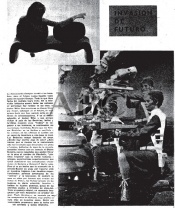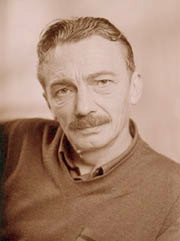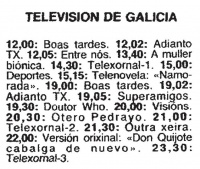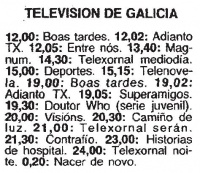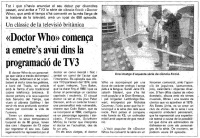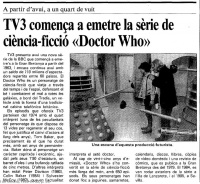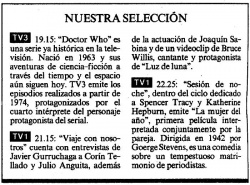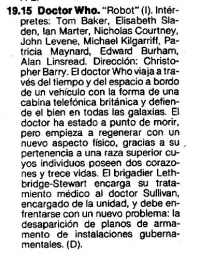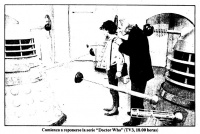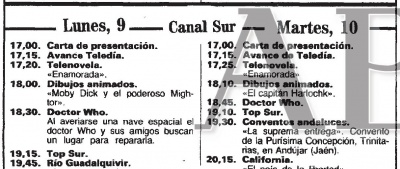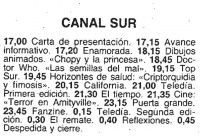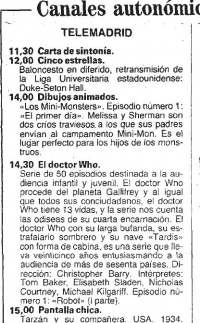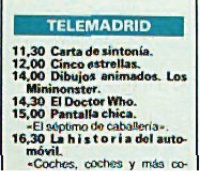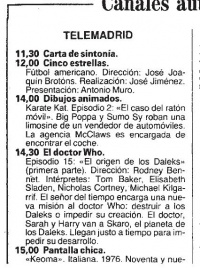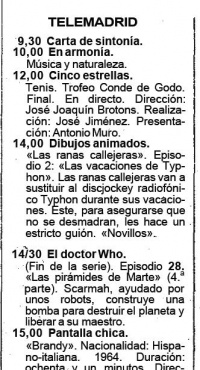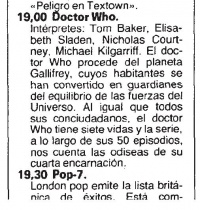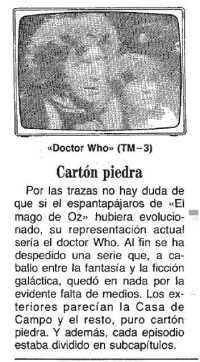Spain
SPAIN is in western Europe; it shares a border with France. Doctor Who screened on a regional basis.
Profile
| Country Number (62?) | 1988 | THIRD WAVE |
| Region | Europe | |
| Television commenced | 1956 | |
| Colour System | 1972 | PAL |
| Language/s | Galician, Catalan, Spanish | Dubbed and/or Subtitled |
Television Stations / Channels
Television commenced in 1956. Spain is served by a number of national and regional television broadcasters.
PAL colour broadcasts commenced in 1972.
Language/s
The principal language of Spain is Spanish, although there are many regional dialects; Doctor Who aired in three different (known) languages: Galician, Catalan and Spanish, for which the episodes were either dubbed or subtitled, or in some cases both.
DOCTOR WHO IN SPAIN
The sale to Spain was towards the tail-end of the Third Wave of sales, but also one of the first sales to Europe (see Selling Doctor Who).
BBC Records
None of our principal BBC Records sources report the sale to Spain.
In DWB issue 43 (May 1987), there is a report that a sale was made to Spain "at the recent European TV Fair, months after France did a U-turn"... (This was the MIPCOM festival held in Cannes, France every year in October.)
In his DWM #204 (September 1993) interview, composer Dudley Simpson makes the mistaken comment that "when they started to screen Doctor Who in France and Spain they didn't have separate music and effects tracks. The only thing they can do is put subtitles on top of the existing programme". While this may have been true of the TV3 screenings, the programme was certainly dubbed into Galician, for which a separate music score would have been sourced.
PETER CUSHING
In the 22 November 1966 issue of ABC there was this article about "Invasions from the future", which mentions and features a photograph of the Drahvins (from 1965's Galaxy 4).
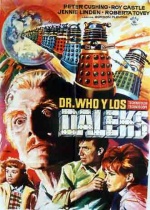 |
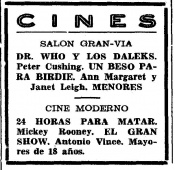
|
A year later, the first of the two Dalek movies screened in Spain, under the title "Dr Who y los Daleks", opening in early 1967. There is no clear indication that the second film screened.
Stories bought and broadcast
TOM BAKER
Twelve stories, 50 episodes:
Three of the four regions adopted a different translation of the story titles. Only some of the Galician titles are known:
| Code | English Title | eps | Galician | Catalan | Spanish |
|---|---|---|---|---|---|
| 4A | Robot | 4 | Robot | Robot | Robot |
| 4B | The Sontaran Experiment | 2 | L'experiment Sontaran | El Experimento Sontaran | |
| 4C | The Ark in Space | 4 | El Arca del Espacio | Una Arca a l’Espai | El Arca del Espacio |
| 4D | Revenge of the Cybermen | 4 | La Venjança dels Homes Cibernétics | La Venganza de los Hombres Ciberneticos | |
| 4E | Genesis of the Daleks | 6 | La Gènesi dels Daleks | El Origen de los Daleks | |
| 4F | Terror of the Zygons | 4 | El Terror dels Zygons | El Terror de los Zigones | |
| 4G | Pyramids of Mars | 4 | Les Piràmides de Mart | Las Piramides de Marte | |
| 4H | Planet of Evil | 4 | El Planeta Diabòlic | El Planeta del Mal | |
| 4J | The Android Invasion | 4 | A Invasión Androide (?) | La Invasió dels Androides | La Invasion de los Androides |
| 4K | The Brain of Morbius | 4 | El Cervell de Morbius | El Cerebro de Morbius | |
| 4L | The Seeds of Doom | 6 | Les Ilavors de la Destrucció | Las Semillas del Mal | |
| 4M | The Masque of Mandragora | 4 | La Máscara de Mandrágora | La Máscara de Mándragora |
NOTE: Some of the Spanish titles are slightly different to those used when the same Tom Baker episodes aired in Mexico and Chile in 1979 – see the chapter on Spanish for a list of the alternative titles.
Spain therefore bought all of GROUP A and B and part of GROUP C of the Tom Baker stories. The sale to Spain must have come following the October 1986 European TV fair that was reported in May 1987.
Presumably only those 50 episodes were purchased as that allowed for a full year's worth of screenings if played weekly, or 13 weeks if stripped at east four days a week, which is a standard practice in television syndication.
Canal Sur and TeleMadrid may even have shared the same tapes.
The episodes that aired in Spanish may have been supplied from copies of the same dubbed episodes that had circulated around Central America and South America in the late 1970s/early 1980s...
Transmission
There were (as far as we can determine) four separate regional screenings of the series across Spain, between 1988 and 1991:
- Galicia / TVG – 1988
- Cataluna / TV3 – 1988 to 1989
- Canal Sur – 1989
- TeleMadrid – 1989 to 1991
Each of these four stations covered a different region of Spain – north west; north east; south; central respectively, meaning that Doctor Who was broadcast to the whole country within a four year period.
(NOTE: The series was also available in Spain via [[Cable and Satellite ]] stations, such as Super Channel, which was received by much of Europe at the time.)
.
.
GALICIA (TVG) (1988)
Doctor Who made its Spanish debut in the autonomous community and region called GALICIA, on the northwest border with Portugal.
The Galician station, TV de Galicia (TVG) commenced broadcasts on 24 July 1985. The official language of Galicia is Galician, a derivative of Portuguese. Like all TVG programming, Doctor Who was dubbed into that language.
The series was called "Doutor Who", being the Galician translation of the series' title.
The voice artist who dubbed for Tom Baker was GONZALO URIARTE, who bears an uncanny resemblance to William Hartnell!
Uriarte worked primarily as a voice actor, dubbing many actors (such as Roy Scheider and Tom Baker), but is chiefly known as the Galician voice of actor Peter O'Toole.
TRANSMISSIONS ON TVG
| ← AIRDATES ...... (CLICK ICON TO GO TO TABLE SHOWING EPISODE BREAKDOWN AND AIRDATES - N/S = story title is Not Stated) |
Doutor Who commenced on Monday, 22 February 1988, at 7.30pm. It screened in that timeslot the first four days of the week (not on Fridays) for the entire run. The 50th and final episode aired on Wednesday, 25 May 1988. (There were five days on which the series was pre-empted.)
- CLICK HERE TO SEE A CLIP FROM "ROBOT" IN GALICIAN
- We can see from this clip that the character names were retained (Sullivan, Benton), as was Dudley Simpson's incidental score.
TVG WEBLINKS
- A profile for Doctor Who - in the Galician language - can be found on wikipedia:
- This forum entry – "MAIS ANIVERSARIOS "O" DOUTOR" - wishes Tom Baker a 'Happy Birthday', and goes to say: "Foi mundialmente famoso por ter sido o cuarto Doutor Who, cuxas dúas primeiras temporadas (1974-75 e 1975-76) foron emitidas pola TVG nos anos oitenta", which translates as "He was world famous for being the fourth Doctor Who, whose first two seasons (1974-75 and 1975-76) were issued by TVG in the eighties".
- This BLOG, and this FORUM, confirm that the run included at least the Cybermen and Dalek adventures. The "Mais Aniversarios "O" Doutor" blogger names The Android Invasion for the picture caption, but it's unclear whether this is was one of the broadcast serials...
- Other weblinks about the TVG screenings:
.
.
CATALUNA (TV3) (1988 to 1989)
Televisio de Catalunya (TVC) was launched on 11 September 1983 as Catalonia's public broadcasting service. The region of Catalonia / Cataluna is in the north east Spain at the border with France. Barcelona is its largest city. It's first and main channel was TV3; it was on that station that Doctor Who screened in 1988 to 1989.
The local dialect is Catalan.
TRANSMISSIONS ON TV3
| ← AIRDATES ...... (CLICK ICON TO GO TO TABLE SHOWING EPISODE BREAKDOWN AND AIRDATES - N/S = story title is Not Stated) |
Doctor Who commenced on Tuesday, 26 April 1988, at 7.15pm. (TVG was screening The Android Invasion at this time.) Episodes aired three times a week, on Tuesdays, Thursdays and Fridays. Stories aired in production order.
From 20 July 1988, a fourth episode was added to the schedules, screening on Wednesdays, and from 25 July, the series also aired on Mondays. The slot also moved to the later time of 8.00pm.
There were at least two pre-emptions during the run; it's not clear whether one of these was on 2 or 3 June, as listings were not available for either date. There was no listing for part one of Pyramids of Mars in June. Did it screen during the weekend or on the Monday?
The 50th and final episode – The Masque of Mandragora part four - aired Wednesday, 10 August 1988.
Sixth months later, a "REPOSICION" (repeat) run commenced on Wednesday, 15 February 1989. Two episodes aired back to back, from 6.00 to 6.50pm or 6.45pm. These double episodes aired Mondays, Wednesdays and Fridays.
The repeat run ended 25 weeks later, on Wednesday, 12 April 1989.
TV3 LISTINGS
The series received a number of "preview" articles in April 1988 and later in 1989. Oddly, three of these were illustrated with a photograph of the Daleks and the first Doctor from The Daleks!
TV3 WEBLINKS
Online information about the TV3 screenings can be read here:
.
.
CANAL SUR (1989)
Canal Sur (Channel South) is a public broadcasting company based in the southern province of Andalucia, of which Seville is the largest city. The station was launched on 28 February 1989.
Television was broadcast in Spanish.
TRANSMISSIONS ON CANAL SUR
| ← AIRDATES ...... (CLICK ICON TO GO TO TABLE SHOWING EPISODE BREAKDOWN AND AIRDATES - N/S = story title is Not Stated) |
Some eight months after the station was launched, Doctor Who commenced - on Monday, 25 September 1989; this was some five months after the conclusion of the repeat run on TV3.
Initially, episodes aired Mondays, Tuesday and Wednesday, at 6.45pm. A month later, two extra days were added, and the series was on all five week days. The serials screened in production order.
There were two pre-emptions during the run; it's not clear what days from 11 to 17 October the series was pre-empted.
The 50th and final episode aired on Wednesday, 13 December 1989. (By this time, the series was also screening on TeleMadrid...)
.
.
TELEMADRID (1989 to 1991)
TeleMadrid was launched in 2 May 1989, becoming the fifth national TV station in Spain.
TRANSMISSION ON TELEMADRID
| ← AIRDATES ...... (CLICK ICON TO GO TO TABLE SHOWING EPISODE BREAKDOWN AND AIRDATES - N/S = story title is Not Stated) |
On 8 October 1989, only two weeks after the series had begun on Canal Sur, the series started on TeleMadrid, screening weekly on Sundays at 2.30pm. Unlike the previous stations, TeleMadrid aired the serials in their correct story order. (It's possible that TeleMadrid used the same tapes that Canal Sur used.)
For reasons not clear, they only aired the first 28 episodes – despite the TV listing for Robot part one stating it was a 50-episode series.
Just over 12 months later, two episodes were repeated, at 7.00pm on 9 and 10 May 1991. The first listing indicated it was directed by Christopher Barry, but the second stated it was The Sontaran Experiment part two; presumably both episodes were for the same serial.
Four months later, on Tuesday, 10 September 1991, TeleMadrid screened a repeat run, on week days at 7.00pm. The slot changed to 6.45pm in its final two weeks. Again, the episodes aired in the correct story order. The repeat run also ended after the 28th episode, despite the listings also saying there were 50 episodes.
There is no evidence or indication that the other 22 episodes screened on TeleMadrid...
.
.
TV listings
Online newspaper archives have been used:
In most cases, the listings use "Doctor Who" rather than the other Spanish title - "Dr Misterio" - that was common in Central and South American countries. For the TVG screenings, the Galician variation, "Doutor Who", was used. TeleMadrid used "El Doctor Who" a couple of times.
In the vast majority of cases, the listings gave episode titles and episode number.
Spain in Doctor Who
- The Spanish conqueror, Cortez, destroyed the Aztec civilisation, as discussed by Barbara and Susan (The Aztecs).
- In 1572, Spain was at war with France (The Massacre).
- One of Pike's crew was called Spaniard (The Smugglers).
- Chameleon Tours flew regularly to Spain (The Faceless Ones).
- During their search for the Master, UNIT "arrested" the Spanish Ambassador (Colony in Space).
- The Doctor took on the stance of a matador during his fight with the bull-like Minotaur (The Time Monster).
- The Two Doctors was filmed in and set in Seville, in southern Spain.
